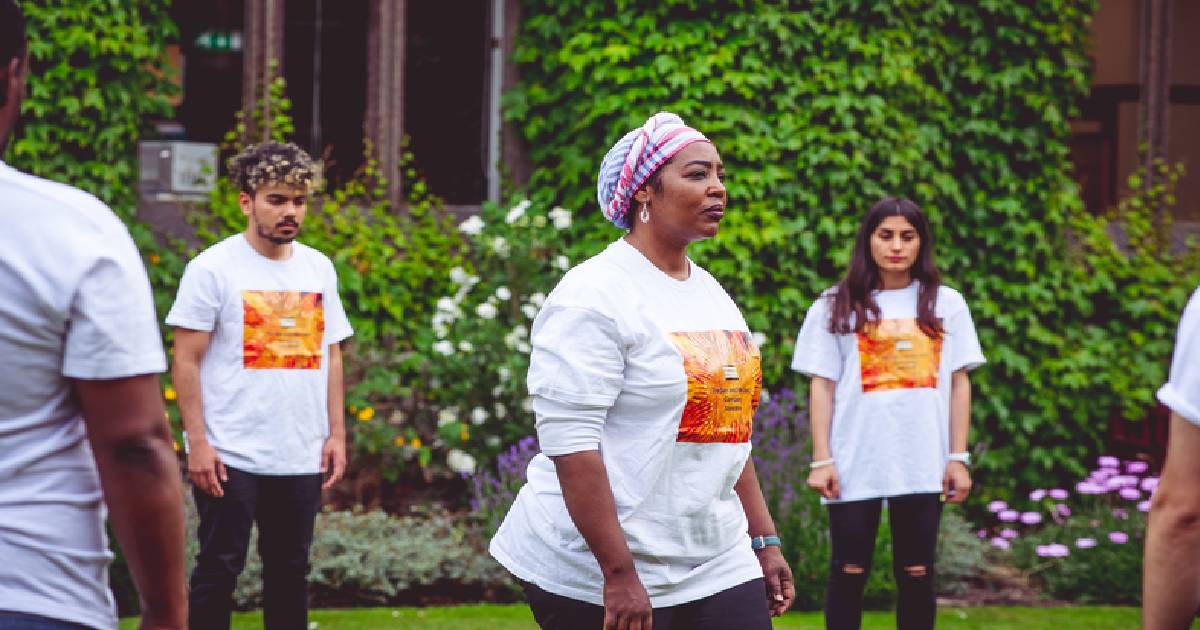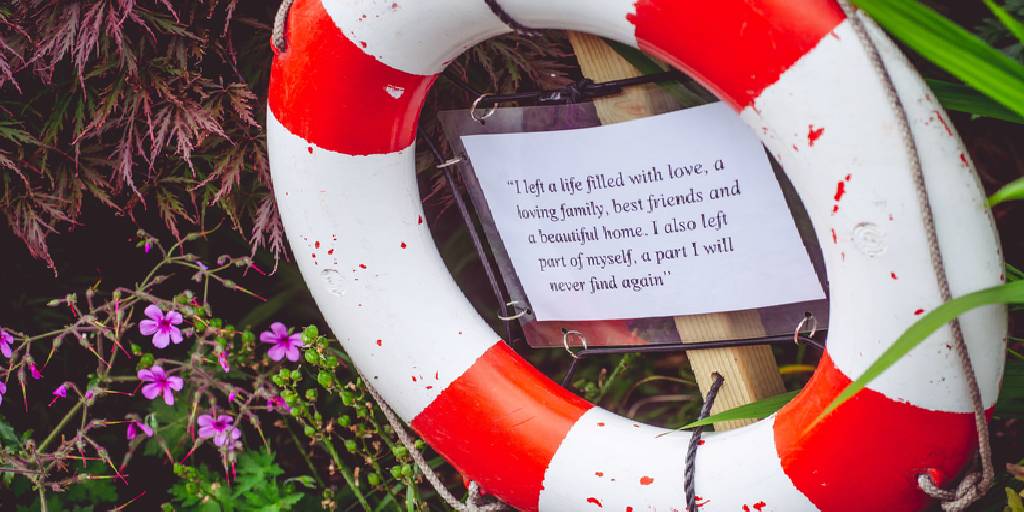Celebrating the talents and powerful stories of refugees through art
27 September 2022 | By: Newcastle University | 3 min read
According to the UN Refugee Agency, by May 2022, more than 100 million people worldwide had been forced to flee their homes – the highest level since records began.
Over 27 million were refugees, with others living as displaced persons and asylum seekers, having escaped conflict, persecution, violence, human rights violations or natural disasters.
Since the Russian invasion of Ukraine in February, more than 5.2 million people have fled the country.
As a University of Sanctuary – a place of safety, solidarity and empowerment for all – we collaborated with multi-arts organisation Skimstone Arts on a week-long event to examine how art recognises the talents and skills, and can articulate what it means to be a refugee.
What we did
As part of Refugee Week we welcomed filmmakers, journalists, artists, musicians and architects on to campus to tell their refugee experiences. Some had previously had careers in photojournalism and music composition, others had never performed before or taken part in art installations.
Senior lecturer, Dr David Baines, of Newcastle University’s School of Arts and Culture, said: ‘At University, we talk about ‘learning and teaching’ and it’s a two-way thing. This was a great opportunity for us all to learn from each other.
‘Together with Skimstone Arts we united a rich talent pool of artists, journalists and creative people from many different countries, all of whom have sought sanctuary here in the North East of England. They were able to bring their work to a wide audience in the heart of Newcastle.’
One of those artists, Skimstone Arts Associate Artist and photojournalist, Ako Ismail, said: ‘It was great to be on campus, to draw awareness to our work and for me, personally, to tell my story to the world. Our stories continue and so do the conflicts that displace people.'
The collaboration included:
• ‘One Day Changes’, a photography exhibition exploring how, in just 24 hours, lives can be changed forever through war and oppression.*
• It also featured a short film, ‘The Smell of Apples’, telling the story of a survivor of the devastating 1988 Halabja chemical attack which killed 5,000 people, who now lives in Birmingham.*
.• A performance around refugee journeys by Skimstone Arts' The Sun & The Soul Company, a group of refugees from Stockton upon Tees. ‘Minds of Healing Hearts’ explored isolation, discovery, a sense of place and identity.*
• Artworks framed in salvaged lifebuoys on the theme ‘For Those in Peril: Seeking Sanctuary’* and a visual art exhibition by the Building Bridges Group, based at the Hatton Gallery Learning Space.
• ‘Music for Humanity’ by international Kurdish composer Rzgar Hama Rauf which was broadcast in the Student Forum and Old Quadrangle on campus.*
• Screening of a selection of films on the theme of ‘Home and Belonging’ in the Hatton Gallery.
* denotes contributions by Skimstone Arts.
Associate Lecturer in Journalism, Ian Wylie, also interviewed Ukraine’s Mariupol State University Dean of Journalism, Svitlana Bezchotnikova, and a group of her students during a special edition of Newcastle University’s Civic Journalism Lab.
Despite their university being destroyed by Russian bombs, they spoke about how they’ve found a way to continue their education and journalism, even though they are now scattered around Europe as refugees.
Listen to Skimstone Radio’s podcast about Refugee Week event.

Photo: For Those in Peril: Seeking Sanctuary
Why is collaboration so important?
Newcastle University has a long-standing commitment to offering educational, research and engagement opportunities to people fleeing violence and persecution. In 2021, we were awarded University of Sanctuary status.
Lecturer in Fine Art, Theresa Easton, said: ‘As a university, we have a responsibility to empower others. We want to open up our wealth of resources and facilities to anyone who is at risk of marginalisation and, in the process, demonstrate the invaluable contributions they make to our region as creative people with skills and expertise in a host of fields.
‘We value important opportunities like this to transcend our labels and celebrate human connection.
‘During the Refugee Week event, we were given an insight into how people start again after losing their home and everything that keeps you safe. The terrifying reality was there in plain sight. It was a privilege to be shown this.’
Skimstone Arts’ Artistic Director, Claire Webster Saaremets, said: ‘Art has an important and accessible part to play as a provocation to have the conversations with those with lived refugee experience and how displaced artists are supported to share their work.
‘Social justice is at the heart of Skimstone Arts and Newcastle University. Together we need to show what we can do to recognise and support others by acknowledging people’s experiences of war and being a refugee and their artistic talent to show it.‘Art speaks to the emotional, intellectual and social way that, as humans, we start to learn from each other. Within the stories shared during Refugee Week we were shown what it means to directly experience life-changing conflict. We were taken on deeply personal journeys of compassion and understanding, challenging our own perspectives of what we hear in the media.
‘It was great to see the conversations taking place after performances and during the exhibition. Art should provoke discussion, insight, and action.’
What is Refugee Week?
Refugee Week is a UK-wide festival celebrating the contributions, creativity and resilience of refugees and people seeking sanctuary.
Founded in 1998, it’s also a growing global movement working to support refugees and asylum seekers to live safely within inclusive and resilient communities where they can continue to make a valuable contribution.
The theme of this year’s festival was ‘healing’ as people from different backgrounds were inspired to connect through arts, cultural and educational events, promoting a better understanding of why people are displaced, and the challenges they face when seeking asylum.
What's next?
Newcastle University’s Professor of Gender and Media, Professor Karen Ross, and Dr Baines are now working on staging an international academic conference and cultural festival. It will be centred on sanctuary and refugees for Refugee Week 2023: Sanctuary Songs.
Dr Baines said: ‘The next stage of the project is letting this talented group of artists lead, facilitate and plan what they want to do.
‘They are artists in their own right and we are here to help them unearth that and navigate away from being labelled as ‘refugees’.'
Skimstone Arts is continuing to support artists with lived refugee experience to exhibit and perform existing and new work in a range of academic, cultural and community venues.
It is currently working on national Holocaust Memorial Day Events 2023 with communities that have experienced genocide, through the theme ‘Ordinary People’. This work will result in a special radio broadcast at Bewick Hall, Newcastle City Library on 25 January 2023.
Find out more
Explore our work in creative arts, in our blog. Alternatively sign up for our newsletter by following the link below.
We're changing the world through our research. To keep up to date with our latest discoveries, sign up for our newsletter below.
